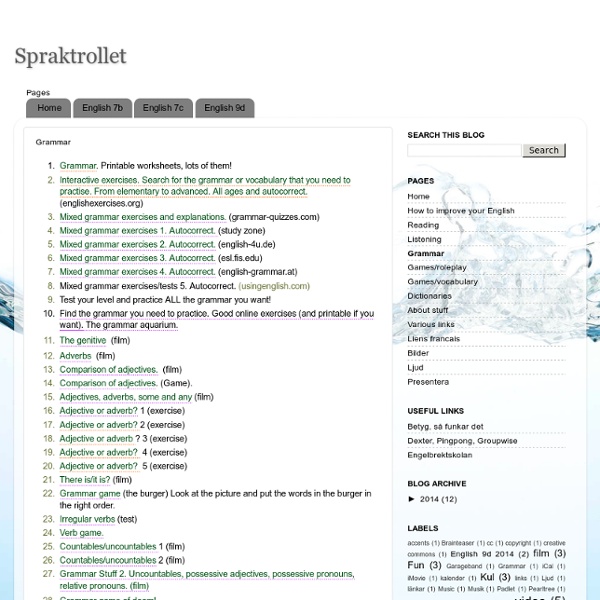



Welcome to English Grammar Express EFL Interactive Grammar Quizzes Printable & PPT Games - Click Here! If you are the type of person who prefers to have games on powerpoint or as printable handouts, we have been thinking of you. We offer board games, powerpoint games and more for the classroom and one to one teaching. They have made my lessons fun and I have no doubt yours will be fun too. Added to the good news are the templates we offer that you can use to create customized games for your classroom and teaching. It is total fun and highly engaging fun lessons with these resources. Read the full story Classroom Tools - Click Here! Get some cool tools for use in your classroom. How to Use Articles (a/an/the) Summary: This handout discusses the differences between indefinite articles (a/an) and definite articles (the). Contributors:Paul Lynch, Allen Brizee, Elizabeth AngeliLast Edited: 2011-03-03 10:04:28 What is an article? Basically, an article is an adjective. English has two articles: the and a/an. the = definite article a/an = indefinite article For example, if I say, "Let's read the book," I mean a specific book. Here's another way to explain it: The is used to refer to a specific or particular member of a group. "A/an" is used to refer to a non-specific or non-particular member of the group. Let's look at each kind of article a little more closely. Indefinite Articles: a and an "A" and "an" signal that the noun modified is indefinite, referring to any member of a group. "My daughter really wants a dog for Christmas." Remember, using a or an depends on the sound that begins the next word. Remember that these rules also apply when you use acronyms: I am a teacher. Definite Article: the
Self-Study English Grammar Quizzes (ESL, EFL) HTML-Only Quizzes Grammar | Places | Vocabulary | Idioms | Homonyms | Scrambled Words | Misc. Activities for ESL Students has over 1,000 activities to help you study English as a Second Language. This project of The Internet TESL Journal has contributions by many teachers. Page Contents Articles | Cloze | Conjunctions | Dialogs | Plurals | Prepositions | Pronouns | Sentence Structure | Tag Questions | Verbs | What's the Correct Sequence | Word Choice | Other Quizzes Grammatik - phrasal verbs exercises English Grammar Exercises - Online English Language Lessons for ESL students and young learners These quizzes and exercises about English grammar and parts of speech are listed by topic. Browse the menu above to view grammar lessons for beginners and elementary English students. If you don't find what you are looking for here, check out our other site menus for more lessons, quizzes, games and other fun activities for English language students and young learners. Adjectives Articles Formal and Informal Language Grammar Tests Homophones Present Simple Tense Past Tense Prepositions Punctuation Making Sentences Subject Verb Agreement Seasonal Activities: Christmas
Can You Catch These Common Grammar Mistakes? (QUIZ) It's time to ask yourself a difficult question: How well do you know the English language? Not to stir up nightmares of your high school English classes or your strict grammarian mother or anything, but we're thinking maybe it's time for a refresher. Take the quiz below to figure out just how well you know the complicated language. Who knows, you may find out you're a grammar pro. Or maybe, you'll be left wondering how you've been getting away speaking English so poorly this whole time. Either way, this WILL be fun. True or False: The title of this quiz is grammatically correct. Indeed! Um, no, it's really not. "Effect" is a... Verb Noun Both, actually! "That's OK, I don't need you ____!" True or False: According to some dictionaries, "literally" now also means "figuratively." Weirdly, yeah. That makes no sense, so no. Which sentence contains an Oxford comma? "Eager to go fishing, I made sure to buy fishing line and bait." "I bought fishing line, bait, and a boat." What does i.e. mean? For example... 1.
Verbs and prepositions II Yesterday I learnt Spanish and when I tried to reconstruct a text I found out that I do not remember the small words like articles and prepositions. They were so small that I did not pay enough attention to them to remember them. Interestingly my students have similar problems with prepositions in English. Therefore I have decided to add more posts on prepositions here to help them. ADVERT There have already been several posts on prepositions: Adjectives and prepositions, Nouns and prepositions and verbs and prepositions. In this post you can find a mind map and two games. Verbs and prepositions – mind map Have a look at the mind map and try to remember the prepositions that are connected with the verbs. Verbs and prepositions – games Do you think you know the prepositions? The second game is called Teacher invaders.
BBC Learning English | For Teachers | Grammar challenge Grammar Rules for the Olympics Let the Grammar Games begin! With the Sochi 2014 Winter Olympics starting tomorrow, many teachers will be discussing the Olympic Games in class over the next two weeks. (For Olympics lesson and activity ideas, check out this post.) But what about the grammar? Does the Olympics take a singular or a plural verb? Is the Olympics Singular or Plural? I tackled this thorny topic two years ago during the 2012 Summer Olympics. Point out to your students that they may see the Olympics taking both a singular and a plural verb throughout the Olympics. Capitalization of Olympic Words 1. Winter OlympicsSochi 2014 Winter Olympic GamesSummer Olympicsthe 2014 Winter Gamesthe OlympicsOlympic podiumOlympic torchOlympic flag 2. Canada, the USA, Japan, Korea, Saudi Arabia, Australia, Brazil, Mexico, Sweden, Kenya, etc.Russian, Norwegian, Chinese, Jamaican, South African, British, Venezuelan, etc.English, French, Hindi, Farsi, Japanese, Korean, Mandarin, Spanish, German, etc. 3. 4. Go team!